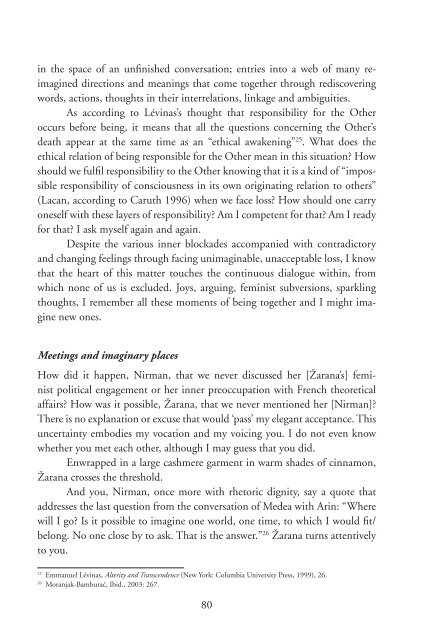Teaching Subjectivity. Travelling Selves for Feminist ... - MailChimp
Teaching Subjectivity. Travelling Selves for Feminist ... - MailChimp
Teaching Subjectivity. Travelling Selves for Feminist ... - MailChimp
You also want an ePaper? Increase the reach of your titles
YUMPU automatically turns print PDFs into web optimized ePapers that Google loves.
in the space of an unfinished conversation; entries into a web of many reimagined<br />
directions and meanings that come together through rediscovering<br />
words, actions, thoughts in their interrelations, linkage and ambiguities.<br />
As according to Lévinas’s thought that responsibility <strong>for</strong> the Other<br />
occurs be<strong>for</strong>e being, it means that all the questions concerning the Other’s<br />
death appear at the same time as an “ethical awakening” 25 . What does the<br />
ethical relation of being responsible <strong>for</strong> the Other mean in this situation? How<br />
should we fulfil responsibility to the Other knowing that it is a kind of “impossible<br />
responsibility of consciousness in its own originating relation to others”<br />
(Lacan, according to Caruth 1996) when we face loss? How should one carry<br />
oneself with these layers of responsibility? Am I competent <strong>for</strong> that? Am I ready<br />
<strong>for</strong> that? I ask myself again and again.<br />
Despite the various inner blockades accompanied with contradictory<br />
and changing feelings through facing unimaginable, unacceptable loss, I know<br />
that the heart of this matter touches the continuous dialogue within, from<br />
which none of us is excluded. Joys, arguing, feminist subversions, sparkling<br />
thoughts, I remember all these moments of being together and I might imagine<br />
new ones.<br />
Meetings and imaginary places<br />
How did it happen, Nirman, that we never discussed her [Žarana’s] feminist<br />
political engagement or her inner preoccupation with French theoretical<br />
affairs? How was it possible, Žarana, that we never mentioned her [Nirman]?<br />
There is no explanation or excuse that would ‘pass’ my elegant acceptance. This<br />
un certainty embodies my vocation and my voicing you. I do not even know<br />
whether you met each other, although I may guess that you did.<br />
Enwrapped in a large cashmere garment in warm shades of cinnamon,<br />
Žarana crosses the threshold.<br />
And you, Nirman, once more with rhetoric dignity, say a quote that<br />
addresses the last question from the conversation of Medea with Arin: “Where<br />
will I go? Is it possible to imagine one world, one time, to which I would fit/<br />
belong. No one close by to ask. That is the answer.” 26 Žarana turns attentively<br />
to you.<br />
25<br />
Emmanuel Lévinas, Alterity and Transcendence (New York: Columbia University Press, 1999), 26.<br />
26<br />
Moranjak-Bamburać, Ibid., 2003: 267.<br />
80

















